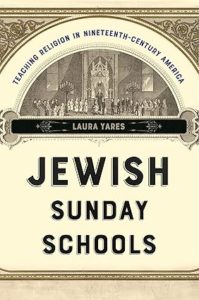Jewish Studies research symposium offers variety, welcomes alumna as keynote in MSU Today
Statement: Serling Institute Supports Israeli Democracy in the Detroit Jewish News
Campus partners collaborate to combat Islamophobia and antisemitism in the JMC News
MSU Jewish Studies Celebrates 30 Years in the Detroit Jewish News
Jewish Studies Program to Host Its Largest Conference
MSU Jewish Studies Program to host its largest conference in MSU Today
Interview of Yael Aronoff by Canadian National TV
Yael Aronoff –MSU’s newly revised Religious Observance Policy draws positive feedback from students, faculty in MSU Today
Yael Aronoff – Serling Institute celebrates 30 years of the Jewish Studies Program in MSU Today
Yael Aronoff- MSU Fights Back: Antisemitic Online Interloper is Rebuffed- the Detroit Jewish News
Yael Aronoff- Hope Against Hope: The New Israeli Government in the Detroit Jewish News
Yael Aronoff O-Eds in the Detroit Jewish News
Yael Aronoff Op-Ed with Saliba Sarsar in the Jerusalem Post
Yael Aronoff Quoted in Vox News
aYael Aronoff – Tribute to Ruth Bader Ginsberg in MSU Today
Student Yael Eichorn in the Detroit Jewish News on minoring in Jewish Studies
Kirsten Fermaglich discusses historical antisemitism in America at UConn in The Daily Campus
Kirsten Fermaglich- Why I Chose to Teach American Jewish History in MSU Today
Kirsten Fermaglich- honor of Holocaust Remembrance Day CSS DEI Newsletter
Deborah Margolis- Mosaic exhibit remembers 2018 Pittsburgh synagogue shooting Lansing City Pulse
Alumni Geoffrey Levin- honor of Holocaust Remembrance Day CSS DEI Newsletter
Student Micaela Procopio in College of Social Science
Student Jordan Robinson in College of Social Science
Amy Simon- Revival: How pandemics fuel racist conspiracy theories in Michigan Public
Amy Simon –This International Holocaust Remembrance Day, remember the worst (and best) of humanity in Lansing State Journal
Amy Simon- Remembering the Holocaust on Yom HaShoah in JMC News
Amy Simon quoted in Newsweek article
Ken Waltzer – Times of Israel “Emory U. and Mock Eviction Notices”
Ken Waltzer – “Deborah Lipstadt talks about American antisemitism, here and now,” Times of Israel
Laura Yares – “Shavuot: The Jewish holiday that became all about children” in The Conversation
Laura Yares-“A reflection on freedom and this Jewish High Holiday season” in the Lansing State Journal
Laura Yares Article in the Jerusalem Post
Laura Yares Article in the Lansing State Journal
Israeli Culture and Emergency Routine: Normalizing Stressco-edited by Vered Weiss
Israeli Culture and Emergency Routine: Normalizing Stress (Eds. Weiss, Ronen, and Dinur, Lexington, 2024) exposes the ways Israeli “emergency routine” leads to perpetual stress and trauma and explores how these conditions are overwhelmingly present in the cultural production of Israeli art and literature. The nine chapters engage with a variety of Israeli cultural artifacts, including poetry, prose, film, and graphic novels, and cast a wide temporal net, reaching from as early as the 1960s to 2019. In doing so, this collection sheds light upon the ramifications of the constant stress of the Israeli emergency routine on academic and cultural discourses and alerts readers to the effects of the physical world on the formulation of world views within social and political realities.
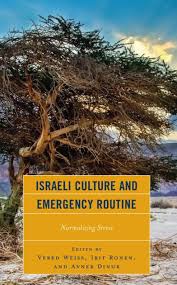
Jewish Sunday Schools: Teaching Religion in Nineteenth Century America, by Laura Yares (NYU Press, 2023)
It chronicles the development of the Sunday school as a mechanism for Jewish education in America, and analyzes its distinctively religious curricula. The first Jewish Sunday school in America was founded by a pioneering group of women in 1838. It soon grew to an entire system, led by women, that educated vast numbers of Jewish youth across the country. Debates soon swirled, however, around the so-called sorry state of “feminized” American Jewish supplemental learning in Sunday schools, and the schools were taken over by men within one generation of their creation. It is commonly assumed that the critiques were accurate and that the early Jewish Sunday school was feminized, saccharine, and overly dependent on Christian paradigms. Tracing the development of these schools from their inception through the first decade of the twentieth century, this book shows this was not the reality. Jewish Sunday Schools argues that the work of the women who shepherded Jewish education in the early Jewish Sunday school had ramifications far outside the classroom. Indeed, we cannot understand the nineteenth-century American Jewish experience, and how American Judaism sought to sustain itself in an overwhelmingly Protestant context, without looking closely at the development of Jewish Sunday school education.
Dr. Yares is an Assistant Professor of Jewish Studies and Religious Studies at Michigan State University.
Emotions in Yiddish Ghetto Diaries: Encountering Persecutors and Questioning Humanity
by Amy Simon
This book uses an empathic reading of Yiddish diarists’ feelings, evaluations, and assessments about persecutors in the Warsaw, Lodz, and Vilna ghettos to present an emotional history of persecution in the Nazi ghettos. It re-centers the daily experiences of psychological and physical violence that made up ghetto life and that ultimately led victims to use their diaries as a place of agency to question and attempt to maintain their own beliefs in pre-war Jewish and Enlightenment ethics and morality. Essentially, this book highlights the benefits of reading with empathy and paying attention to emotions for understanding the experiences of people in the past, especially those facing tragedy and trauma.
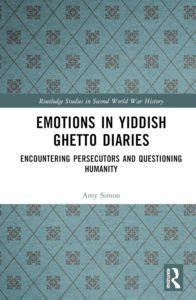
Continuity and Change in Political Culture: Israel and Beyond
Newly released book on November 15, 2020 Co-edited by Serling Institute for Jewish Studies and Modern Israel Director Yael Aronoff and Ilan Peleg and Saliba Sarsar in honor of Myron J. Aronoff.
Ten leading scholars and practitioners of politics, political science, anthropology, Israel studies, and Middle East affairs address the theme of continuity and change in political culture as a tribute to Professor Myron (Mike) J. Aronoff whose work on political culture has built conceptual and methodological bridges between political science and anthropology.
Topics include the legitimacy of the two-state solution, identity and memory, denationalization, the role of trust in peace negotiations, democracy, majority-minority relations, inclusion and exclusion, Biblical and national narratives, art in public space, and avant-garde theater. Countries covered include Israel, Palestine, the United States, the Basque Autonomous Region of Spain, and Poland. The first four chapters by Yael S. Aronoff, Saliba Sarsar, Yossi Beilin, and Nadav Shelef examine aspects of the conflict and peace negotiations between Israel and the Palestinians, including alternative solutions. The contributions by Naomi Chazan, Ilan Peleg, and Joel Migdal tackle challenges to democracy in Israel, in other divided societies, and in the creation of the American public. Yael Zerubavel, Roland Vazquez, and Jan Kubik focus their analyses on aspects of national memory, memorialization, and dramatization. Mike Aronoff relates his work on various aspects of political culture to each chapter in an integrative essay in the Epilogue.
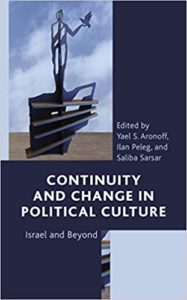
Wandering Jews: Global Jewish Migration (The Jewish Role in American Life: An Annual Review)
by Steven J. Gold
Book Description
Despite the importance of historical and contemporary migration to the American Jewish community, popular awareness of the diversity and complexity of the American Jewish migration legacy is limited and largely focused upon Yiddish-speaking Jews who left the Pale of Settlement in Eastern Europe between 1880 and 1920 to settle in eastern and midwestern cities.
Wandering Jews provides readers with a broader understanding of the Jewish experience of migration in the United States and elsewhere. It describes the record of a wide variety of Jewish migrant groups, including those encountering different locations of settlement, historical periods, and facets of the migration experience. While migrants who left the Pale of Settlement in the late nineteenth and early twentieth centuries are discussed, the volume’s authors also explore less well-studied topics. These include the fate of contemporary Jewish academics who seek to build communities in midwestern college towns; the adaptation experience of recent Jewish migrants from Latin America, Israel, and the former Soviet Union; the adjustment of Iranian Jews; the experience of contemporary Jewish migrants in France and Belgium; the return of Israelis living abroad; and a number of other topics. Interdisciplinary, the volume draws upon history, sociology, geography, and other fields.
Written in a lively and accessible style, Wandering Jews will appeal to a wide range of readers, including students and scholars in Jewish studies, international migration, history, ethnic studies, and religious studies, as well as general-interest readers.
Steven J. Gold
Steven J. Gold is professor and graduate program director in the Department of Sociology at Michigan State University and is a faculty affiliate of the Serling Institute for Jewish Studies and Modern Israel. His scholarly interests include international migration, ethnic economies, ethnic community development, qualitative field methods, and visual sociology. Gold is the author, coauthor, or coeditor of eight books, including The Israeli Diaspora, which won the Thomas and Znaniecki Award from the American Sociology Association’s International Migration Section for the best book on international migration in 2003. Author of over one hundred journal articles and book chapters, Gold received the Charles Horton Cooley Award for Distinguished Scholarship in Sociology from the Michigan Sociology Association in 2007 and the Distinguished Career Award from the American Sociological Association’s International Migration Section in 2019.

A Rosenberg By Any Other Name: A History Of Jewish Name Changing
by Kirsten Fermaglich
A Rosenberg By Any Other Name: A History Of Jewish Name Changing in America received the American Jewish Historical Society’s Saul Viener Book Prize. The prize is awarded biannually and is given to original works in English that focus on American Jewish History. The book is Kirsten Fermaglich’s original and compelling study of Jewish name changes in New York in the twentieth century. It effectively illuminates some of the key cultural and structural dynamics that enabled the flourishing of antisemitism in employment, education, and social life from the 1910s to the 1960s, and how Jews responded. In Dr. Fermaglich’s hands, New York City Civil Court records, which she reviewed in the thousands, proved to be a remarkable source for the study of Jews, who were the majority of people who filed for name changes. The petitions offered rationales for why people sought new names, and from them she builds a powerful case for what motivated first and last name changes and what did not. This first historical study of Jewish name changes is a work of intellectual depth and originality that draws on untapped sources to tell a story about real men and women who negotiated identity, the state, and antisemitism, and the consequences of their strategies.
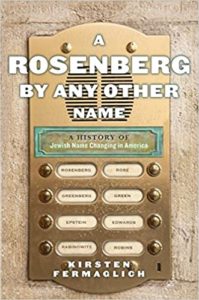
MSU and Local Institutions Bring Holocaust History to Michigan with New Exhibits
Statement: Serling Institute Supports Israeli Democracy
MSU Jewish Studies Celebrates 30 Years
Sixth Annual Michael & Elaine Serling Lecture on Modern Israel Nov. 8 in E. Lansing
Reps. Slotkin, Lawrence Stress Black-Jewish Community Conversations in Virtual Event
Student Yael Eichorn- Reflection: Finding My Jewish Identity At MSU
Yael Aronoff- MSU Fights Back: Antisemitic Online Interloper is Rebuffed
Yael Aronoff- Don’t Annex: Save the Two-State Solution
Student Benjamin Francis- MSU Student Attends Michigan-Israel Business Innovations Conference
